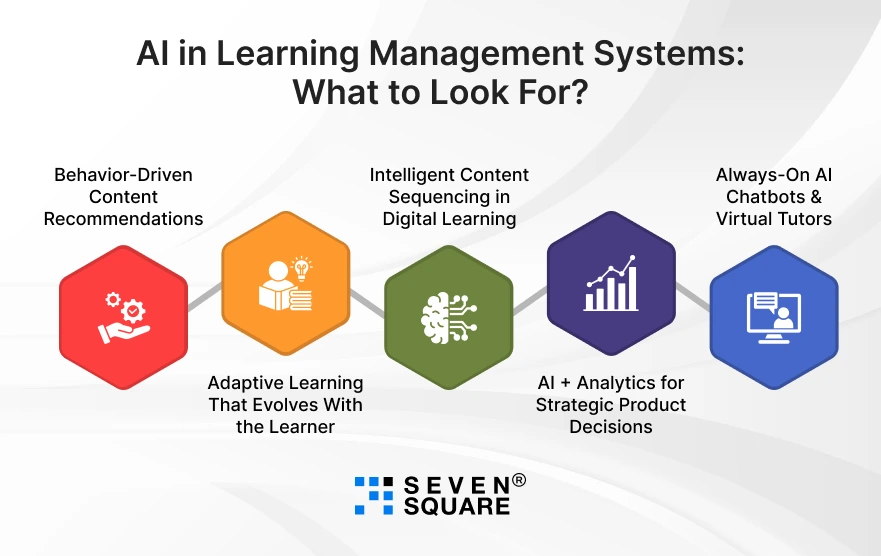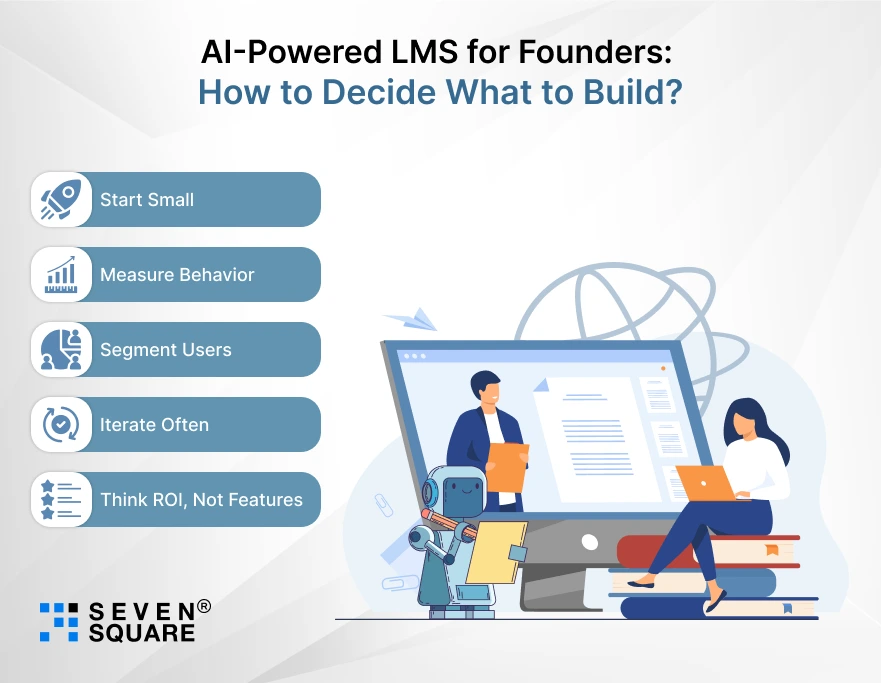Let’s start with a question we hear often from EdTech founders:
“Why are students still disengaged, even after digitizing our content and tracking their progress?”
It’s a fair question and one we’ve seen across industries, from K-12 to corporate training.
You may have a robust LMS in place, with modules, assessments, and certification workflows.
Yet learners are dropping off, skipping ahead, or simply not learning what you need them to. That’s not a tech problem; it’s a personalization problem.
And that’s exactly where AI in LMS platforms comes in as it changes static learning management systems into AI-powered LMS solutions that adapt, evolve, and personalize every learner’s path.
Here in this blog, you can learn the importance of AI in EdTech and how AI can help in personalized learning LMS solutions.
The Real Gap: One LMS for All, But One Learner Isn’t Like the Other
Most LMS platforms are structured like a one-size-fits-all program. Everyone sees the same path, the same content order, and the same assessments.
That worked in the old-school classroom, but not in a digital-first, outcome-driven learning environment.
AI in EdTech has brought us a game-changing shift: content can now adapt based on behavior, knowledge gaps, and learning style.
No more forcing your top performers to sit through the basics. No more letting struggling learners fall behind because the next module auto-unlocks without support.
We’ve worked with education providers, healthcare training firms, & compliance-heavy industries to roll out AI-driven learning platforms that truly understand the user’s journey.
They’re working tech that impacts real outcomes.
What Is an AI-Powered LMS?
A traditional LMS stores, delivers, and tracks content.
An AI based LMS does all that and also learns from users. It uses machine learning in LMS to:
- Recommend content based on user progress.
- Adjust difficulty based on performance.
- Suggest optimal learning paths.
- Provide real-time feedback and nudges.
- Analyze patterns to improve course delivery.
In short, it changes a static LMS into a personalized learning LMS that gets smarter with every interaction.
Personalized Learning Paths: Not Just a Buzzword
Let’s explore the idea of personalized learning paths a bit further.
Every learner has a unique baseline, pace, and style. With AI based learning paths, your LMS can:
- Pre-test learners and skip modules they already know.
- Adapt content based on quiz performance.
- Offer supplemental resources for weaker areas.
- Deliver micro-learning modules for fast learners.
- Restructure course flow to maximize retention.
For founders and PMs, this means lower dropout rates, faster upskilling, and clearer ROI.
In a project we led for a logistics training company, we used AI-based course recommendations and micro-assessments to reduce learner fatigue.
Completion rates jumped by 38%.
Adaptive Learning in LMS: A Closer Look
Adaptive learning LMS features go beyond quizzes and dashboards. It’s about dynamically changing the journey. Here are some capabilities we’ve implemented:
- Real-time difficulty tuning: Questions adjust based on how the learner is performing.
- Content clustering: AI groups learners by pattern (e.g., visual, interactive, or text-based learning preferences).
- Predictive pathing: Based on past behavior, the LMS forecasts where the learner may need help.
When we integrated AI for corporate training LMS use cases, the impact was visible in less than 30 days: course completion times dropped by 25%, and assessment scores improved across departments.
AI in Learning Management Systems: What to Look For?

Every LMS vendor today says their platform uses AI.
But as a founder or product lead, your job is to ask, Does this improve learning outcomes?
We’ve implemented real-world AI based LMS solutions that transformed sluggish platforms into adaptive learning LMS ecosystems with higher engagement, faster upskilling, and smarter analytics.
Here’s what to truly look for in an AI-integrated learning management system:
1. Behavior-Driven Content Recommendations
- The best AI in LMS platforms don’t just push content, they understand the learner.
- Through machine learning in LMS, the system learns from user interaction patterns (like video pauses, quiz scores, and time spent on topics) and delivers AI-based course recommendations that feel personal and timely.
- This level of personalization increases course completions, learner motivation, and reduces drop-offs.
2. Adaptive Learning That Evolves With the Learner
- Forget static modules.
- A modern adaptive learning LMS dynamically changes difficulty, content sequence, and even media format based on ongoing learner behavior.
- This builds personalized learning paths that evolve as users’ progress.
- Struggling with assessments? The system slows down and introduces simpler micro-lessons. Acing every test? It fast-tracks advanced content.
3. Intelligent Content Sequencing in Digital Learning
- Traditional LMS platforms follow a linear path.
- But with AI in digital learning content, your platform can now auto-rearrange the lesson flow based on what the learner already knows or struggles with.
- This avoids repetition, prevents disengagement, and creates a personalized learning LMS experience that feels truly adaptive.
- Integrating AI in online education means using real performance data to decide: should a learner skip ahead, stay back, or explore supplementary material?
4. AI + Analytics for Strategic Product Decisions
- What separates hype from real value in AI-integrated LMS platforms is analytics.
- You need actionable metrics. We’re talking about learner prediction models, engagement drop-off alerts, and content effectiveness scoring.
- With AI and analytics integration in LMS platforms, your product team gains superpowers to tweak content, re-order modules, & intervene early.
5. Always-On AI Chatbots & Virtual Tutors
- An underrated game-changer in AI for LMS is 24/7 learning assistance.
- AI chatbots and virtual tutors in LMS platforms can explain tough concepts, guide the learner to the next module, and even simulate conversations for language or customer service training.
- They boost satisfaction, free up your human instructors, and offer consistent learning support, day or night.
If your current LMS lacks these capabilities, it might be time to rethink your tech stack.
At Seven Square, we build AI-based LMS solutions that do more than automate; they understand, adapt, and deliver results.
Why EdTech Companies Choose Seven Square for Smart LMS Solutions?
When it comes to building scalable, AI-powered learning systems, we ensure outcomes.
At Seven Square, we’ve helped founders, EdTech startups, and enterprises implement AI in learning management systems that don’t just manage content but truly personalize the learning journey.
Our development team builds AI LMS platforms that are fast, user-centric, and results-driven.
Here’s how we’ve delivered real impact using AI in EdTech, personalized learning LMS design, and adaptive learning:
1. Self-Study: UPSC Preparation App for Competitive Exam Learners
We developed a mobile-first learning management system that helps users prepare for India’s UPSC exams. Key features included:
- Daily topic tracking and subject-wise progress reports.
- Test series module with question explanations and user analytics.
- Role-based login for students and administrators.
- Backend content management system for course uploads.
This project focused on helping users stay consistent in their preparation while giving admins control over learning paths and updates.
2. IELTS: A Test Preparation App for English Language Learners
We helped an EdTech company build a focused IELTS learning platform to support users across listening, speaking, reading, and writing modules.
Features included:
- Speaking practice with time tracking and sample answer comparisons.
- Topic-based mock tests and writing tasks with visual progress indicators.
- Backend for content upload and performance review.
- Clean, multilingual-ready UI for a global learner base.
This app enabled structured, self-paced learning for users aiming to improve their IELTS scores.
Want to Integrate AI in Learning Management Systems? Contact Us Now!
Where AI in EdTech Is Headed (and Why You Should Care)?
AI in EdTech isn’t just about efficiency anymore. It’s becoming central to:
- Student engagement
- Outcome-based learning
- Workforce-ready skills mapping
- Continuous professional development
Features like AI chatbots and virtual tutors in LMS are reshaping how learners interact with your platform.
Combined with AI and analytics integration in LMS platforms, it’s no longer about content delivery; it’s about intelligent facilitation.
AI-Powered LMS for Founders: How to Decide What to Build?

If you’re a founder trying to integrate AI into your LMS, here’s a practical approach:
- Start Small: Add AI-based content recommendations.
- Measure Behavior: Use AI to observe drop-offs and time spent.
- Segment Users: Group by performance or learning style.
- Iterate Often: Use micro-feedback loops.
- Think ROI, Not Features: Every AI add-on should tie back to user retention, NPS, or outcomes.
We’ve helped product teams do this without blowing timelines or burning resources. The key is to treat AI as a layer of intelligence, not complexity.
Don’t Build a Smarter LMS, Build a More Human One
The irony of all this AI in LMS talk? It’s not about the tech. It’s about making learning more human again.
When your platform recognizes that learners aren’t all the same, that’s when transformation begins.
Personalized learning LMS solutions are the future of education.
And if you’re ready to take action, make it with a team like us that understands product, scale, and user needs.
FAQs
- An AI-based LMS (Learning Management System) uses artificial intelligence to personalize the learning experience.
- It goes beyond storing and delivering content; it analyzes learner behavior, adapts course difficulty, recommends content, and optimizes learning paths in real time.
- This improves engagement, retention, and outcomes.
- Adaptive learning LMS platforms dynamically adjust content delivery based on real-time feedback.
- This ensures that fast learners are challenged and slower learners receive support.
- It leads to better knowledge retention and fewer drop-offs.
- Yes. By using AI in EdTech, platforms can identify disengaged users early through analytics, provide timely nudges or support via chatbots, and deliver personalized content, all of which significantly reduce dropout rates and improve course completion.
- Yes, with AI in digital learning content, platforms can identify user preferences and learning challenges, then deliver content in preferred languages or formats (text, video, micro learning).